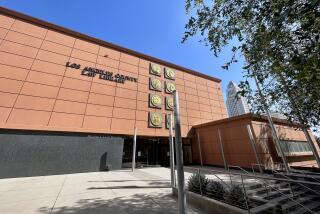Generosity and the Bar
- Share via
Recently, someone we know had a law firm draw up a fairly simple will and two other relatively uncomplicated documents--all told, about eight hours of legal work. The bill came to $825. Our friend was shocked, but on a $55,000 annual salary, he was able to afford it.
But what about the person trying to raise a family on $10,000 year?
In San Diego County, more than 60,000 poor people a year need a lawyer to help with such civil matters as divorces, wills, consumer fraud, welfare appeals or immigration hearings. Sometimes, their safety depends on legal help. Without it, escaping poverty is impossible.
But free legal services are scarce. Last year, the Legal Aid Society and the San Diego Volunteer Lawyer Program were able to serve 4,000 clients--far short of the need. The Legal Aid Society alone gets an average of 474 requests for assistance a day, while its 17 staff attorneys can handle only about 65.
Some of the rest are handled by the 820 lawyers in the 5-year-old Volunteer Lawyer Program, which provided about $2 million in free legal services last year. The generosity of those attorneys--mostly from small practices--is a credit to their profession, which has a reputation for avarice.
But more generosity is needed, especially among San Diego’s largest law firms, where only about 10% of the attorneys participate in the volunteer program. That’s about half the rate in San Francisco, and even further behind Los Angeles, where 70% of the volunteers come from large firms.
Participation by large firms is especially important because they have more support services such as paralegals, secretaries, clerks, etc. But pressure on young attorneys to accumulate “billable hours” is intense. They have little time for pro bono, or volunteer, work if they want to meet their goals and advance in their careers.
Large firms also point to the considerable free work they do for nonprofit organizations. Those contributions should not be underestimated, but they cannot substitute for helping an unemployed mother win sole custody of her daughters because they have been sexually abused by their father, or helping an AIDS victim fight an eviction.
As the American Bar Assn.’s model Code of Professional Responsibility states, “Every lawyer, regardless of professional prominence or professional workload, should find time to participate in serving the disadvantaged.”
Senior partners in large law firms can further that goal substantially through personal example and with policies that encourage pro bono work.
More to Read
Sign up for Essential California
The most important California stories and recommendations in your inbox every morning.
You may occasionally receive promotional content from the Los Angeles Times.













